Brazil protests spread in Sao Paulo, Brasilia and Rio
- Published
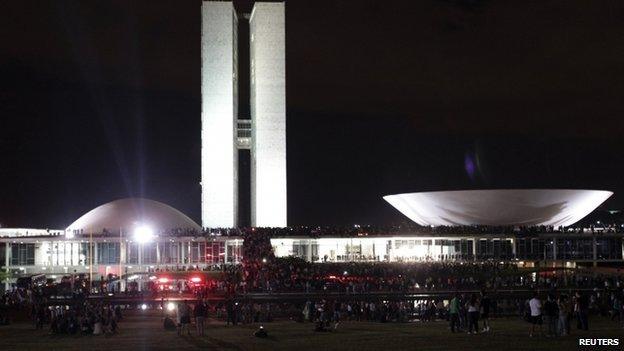
Protesters gathered outside the National Congress building in Brasilia and climbed on the roof
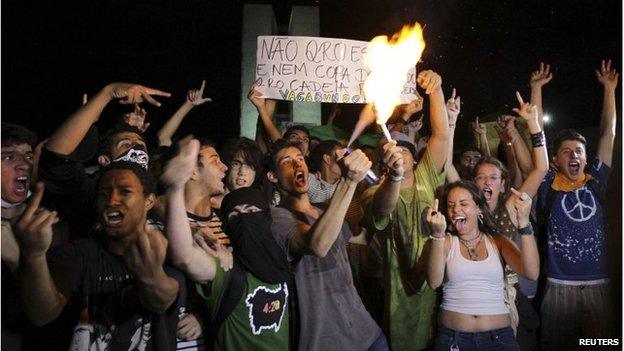
The demonstrators held placards and shouted slogans calling for better public services
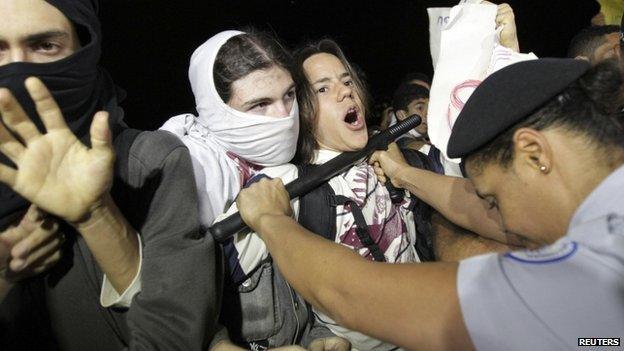
Police tried to control the protesters
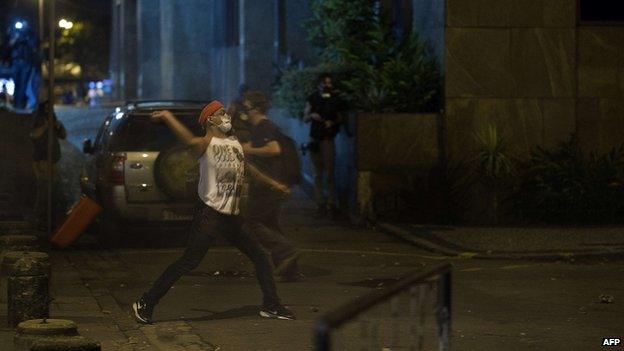
While most of the demonstrations were peaceful, there were outbreaks of violence
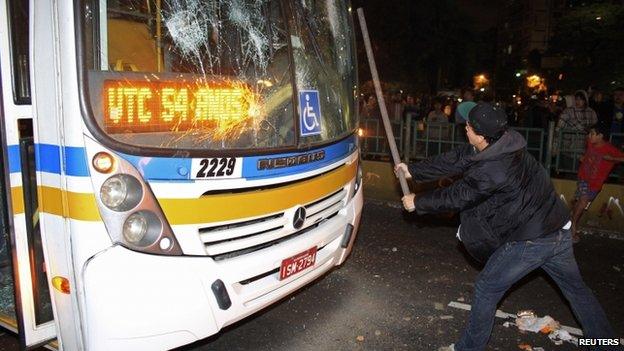
In Porto Alegre, a bus was vandalised and set on fire
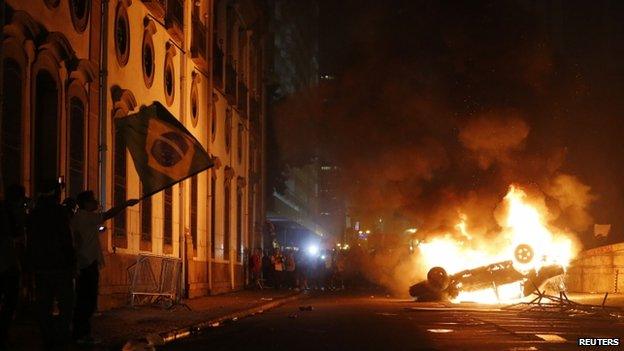
In Rio de Janeiro, a car was torched and bonfires were lit in the streets
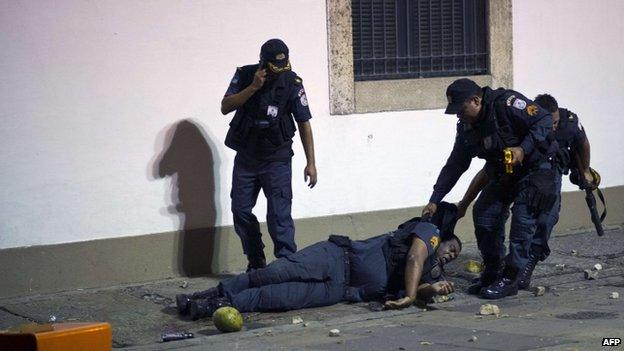
Five police officers were wounded in the clashes in Rio
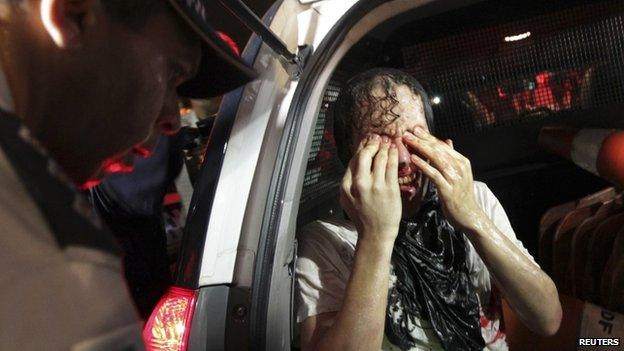
Protesters were also injured in Brasilia, where many had formed a human chain
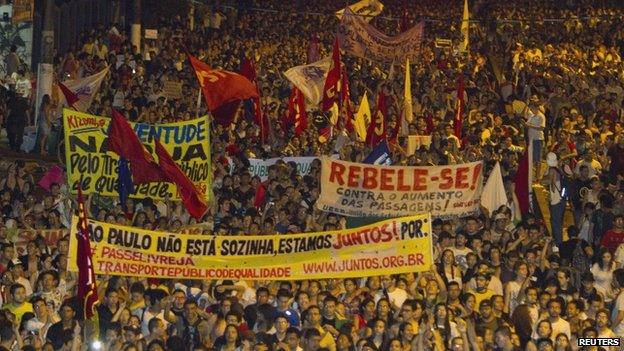
Thousands also marched in the northern city of Belem, in the state of Para
As many as 200,000 people have marched through the streets of Brazil's biggest cities, as protests over rising public transport costs and the expense of staging the 2014 World Cup have spread.
The biggest demonstration was in Rio de Janeiro, where 100,000 people joined a mainly peaceful march.
In the capital, Brasilia, people breached security at the National Congress building and scaled its roof.
The protests are the largest seen in Brazil for more than 20 years.
'Not satisfied'
In Brazil's largest city, Sao Paulo, about 65,000 people took to the streets.
The wave of protests kicked off earlier this month when Sao Paulo residents marched against an increase in the price of a single bus fare, from 3 reals ($1.40, £0.90) to 3.20.
Authorities said the rise was well below inflation, which since the last price increase in January 2011 has been 15.5%, according to official figures.
The way these initial marches were policed - with officers accused of firing rubber bullets and tear gas at peaceful protesters - further incensed Sao Paulo residents and shifted the focus from rising transport costs to wider issues.
"For many years, the government has been feeding corruption, people are demonstrating against the system," Graciela Cacador told Reuters news agency.
Others complained about vast sums of money spent on hosting the 2014 World Cup and the 2016 Olympics instead of being invested in health and education.
"This is a communal cry saying: 'We're not satisfied!'," Maria Claudia Cardoso told the Associated Press news agency.
"We don't have good schools for our kids. Our hospitals are in awful shape. Corruption is rife. These protests will make history and wake our politicians up to the fact we're not taking it anymore," she said.
"We need better education, hospitals and security, not billions spent on the World Cup," said one mother who attended the Sao Paulo march with her daughter.
"We're a rich country with a lot of potential but the money doesn't go to those who need it most," 26-year-old photographer Manoela Chiabai told the Associated Press.
Demonstrators chanted slogans, including "The people have awakened", BBC Brasil's Julia Carneiro reports from Sao Paulo.
Police took a hands-off approach at Monday's demonstration following an earlier meeting between protest organisers and security chiefs at which they had agreed that regular police would not carry rubber bullet guns.
'Legitimate'
Protests were reported in as many as 11 cities on Monday.
In Rio 100,000 people took part in a mainly peaceful march, although a small group threw rocks at police, wounding five officers. They also set fire to a car and vandalised the state assembly building.
There were violent clashes overnight in Brasilia and Rio
Police there reportedly used tear gas, pepper spray and rubber bullets to disperse them.
More than 40 people were arrested in the southern city of Porto Alegre after a small group peeled away from the main march of about 10,000 demonstrators and set alight bins and shops.
They were booed by those participating in the main march, who called for a peaceful protest.
On Tuesday, Porto Alegre Mayor Jose Fortunati said he had sent a bill to the city council proposing that bus companies be exempt from taxes in return for them promising to lower their fares.
There were also clashes with police in Belo Horizonte, which was hosting the latest game in the Confederations Cup, the warm-up tournament for the World Cup.
An 18-year-old is reportedly in a stable condition in hospital after falling from an overpass in the city.
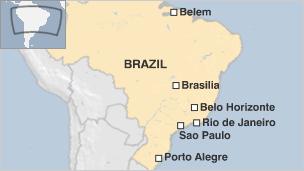
And in Brasilia, more than 200 protesters managed to get onto the roof of the National Congress building. After negotiations with police, the crowd agreed to leave. Later, youths formed a human chain around the building, the AFP news agency said.
"Peaceful demonstrations are legitimate," President Dilma Rousseff said in a statement. "It is natural for the young to demonstrate."
However, Sports Minister Aldo Rebelo warned protesters that the authorities would not allow them to disrupt the Confederations Cup or next year's World Cup.
"The government assumed the responsibility and the honour to stage these two international events, and will do so, ensuring the security and integrity of the fans and tourists," he said.
The United Nations High Commissioner for Human Rights, Navi Pillay, called on both sides to remain calm.
"We urge the Brazilian authorities to exercise restraint in dealing with spreading social protests in the country, and also call on demonstrators not to resort to acts of violence in pursuit of their demands," said a spokesman for the High Commissioner.
"With further protests planned, we are however concerned that the reported excessive use of police force in recent days should not be repeated."
- Published18 June 2013
- Published16 June 2013
- Published14 June 2013
- Published12 June 2013